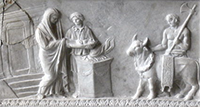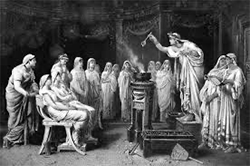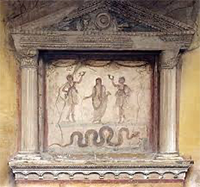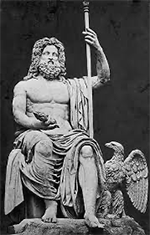Roman Religion
Roman gods numbered in the thousands. These included guardian spirits that watched over trees and rocks and streams, as well as buildings and animals and people. Some gods watched over the harvest or the army or the weather. Other gods caused the Sun to appear and disappear or the tide to roll in and then out. Roman people named many of these gods. And as the Romans allied, conquered, or otherwise absorbed more people within their sphere of influence, the number of gods increased. When Rome conquered Greece, the Roman people adopted the Greek gods, changing the names of some of them. A list of the major Roman gods includes these:
Each god had a festival day, which was usually a public holiday. Festivities on that day focused on the specific god or goddess. The Roman calendar at one time included 40 annual religious festivals. Some festivals lasted more than one day. Some gods had specific purposes:
The Romans built temples to honor their various gods in the cities and towns that made up the Roman Republic and then the Roman Empire. A city typically declared its own patron deity and was free to determine how the worship of that deity was to be conducted. If conquered centers of living already had temples to other gods, the Romans sometimes repurposed those temples in order to honor a Roman god; however, the Romans often left such things as they were, under the doctrine of religious noninterference that they sometimes practiced. (Notable exceptions to this noninterference came at the expense of Jews and Christians, at various times.) The Romans also tolerated devotions to non-Roman gods such as Isis and Mithras, so long as the worshipers did not get out of hand. The first temple in Rome, many historians say, was built on the Capitoline Hill and honored Jupiter, Juno, and Minerva. Other temples followed. A temple in the Roman era generally followed a building pattern that consisted of a triangle-shaped roof that was supported by a number of pillars. Behind the pillars was a main doorway, up to which steps led. Inside was a statue of the god to which the temple was dedicated and an altar on which to make sacrifices. 
Animal sacrifice was a main part of worship. Romans sacrificed bulls, pigs, and sheep to the gods, as a way of imploring the gods to hear their pleas. One person who took great notice of the result of an animal sacrifice was an augur. This person would examine the entrails of the animal in order to predict the future; bold was a person who ignored such predictions. Another associated pronouncement was the declaration of an omen, drawn from the study of the flight of birds; such events were judged to be auspicious, in either positive or negative terms. 
Also in Rome were a number of priestly colleges. The men or women who served there oversaw public events, such as a reading of the auspices or a reading from the Sibylline books–both means of predicting a possible future for an individual or the people at large. One of the most well-known of these colleges was the Virgines Vestales, or College or Vesta. The Vestal Virgins were young women who kept burning the sacred fire in the Temple of Vesta. Selected when they were between 6 and 10, these women performed various temple duties for 30 years: 10 years learning the duties, rites, and mysteries; 10 years performing the sacred duties; and 10 years teaching and training new women to take their place. The chief priest, beginning with the advent of the Empire, was the Emperor himself, known as the pontifex maximum. 
In the home, people kept shrines in which a figure of a favorite god stood or sat. The Romans would offer gifts and/or libations for the god in the shrine. It was this importance of adherence to ritual, the Romans believed, that would gain the blessing of the gods. This was in contrast to other religions in which people believe that their behavior would determine whether they won the favor of their god(s). The father or other male who was the head of the household had the lead role in terms of religious worship, which occurred daily. One of the ways in which the Romans expanded the number of gods available to worship was to deify emperors. Romulus, the founder of Rome, had been deified and worshiped as Quirinus. Augustus, who founded the Empire, was the first emperor to be so declared, not long after he died. He was then worshiped along with the other, more traditional gods. Subsequent emperors declared their predecessor to be a god and directed the Roman people to worship that former emperor as such. Some emperors, notably Caligula and Nero declared themselves to be living gods and demanded that people worship them accordingly. |
|
Social Studies for Kids
copyright 2002–2026
David White



 Janus was the god of doors and of beginnings and endings
Janus was the god of doors and of beginnings and endings
 Mars was a very important god for Roman soldiers, who thought that he determined the victors in a battle; as a result, soldiers would pray to Mars to protect them and grant them victory.
Mars was a very important god for Roman soldiers, who thought that he determined the victors in a battle; as a result, soldiers would pray to Mars to protect them and grant them victory.
